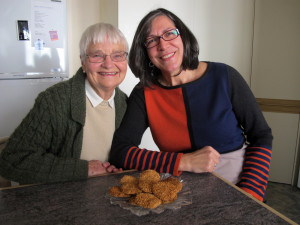Quarter century bonds of friendship stem ‘a little help’

Rosemary and May
A retired nursing educator from Brighton and a migrant from Lebanon who fate brought together as volunteer tutor and student have forged a friendship that has lasted 25 years.
May Farrah and her family arrived in Australia in June 1989 as skilled migrants but also de facto refugees from the brutal civil war that had laid waste to much of her homeland.
One of the first people she met was Rosemary Norman, who had recently retired and had taken up volunteering as an English tutor with settlement agency AMES.
May says Rosemary was the first Australian she met and one of the few people she had contact with outside of her own family in those early days.
“Rosemary was the first Australian I met and I only had couple of other friends anyway. She was seeing me on a weekly basis so we soon became friends,” May said.
With May busy attending English classes and working to have her professional qualifications accredited, Rosemary helped out by taking May’s sons to school or to football.
“I was working part-time when the boys were young and I think they really became attached to Rosemary. In a way she was like a family member,” she said.
“She sometimes knew more about what they were doing than I did. We were building our lives so it was great to have someone they were comfortable with… and it was important for them to have a grandparent figure as our own family was so far away.”
For her part, Rosemary says she feels privileged to have had the experience of watching May’s children grow up.
“It was lovely to be able to give a little help to the family as they were starting their new life here and establishing themselves,” she said.
May’s journey from war-torn Lebanon to her comfortable suburban home in Melbourne’s south-east is a story familiar to many who have fled conflict.
She recalls how her family was living in Jounieh on the coast north of Beirut when civil war broke out.
“Our community was being shelled and we were afraid for our kids. We lived through the war and at one stage we lived in a shelter for a month,” she said.
“My eldest son Mike remembers that time. It was scary. One time we returned home after spending a night in the shelter and shell had gone through our dining room.”
May says she and her family left Lebanon at 2am on a dark night in a small boat. They initially went to Cyprus and then on to Australia.
“We wanted to go to Canada because we had family there but at the time Australia was opening the door to skilled migrants.
“My husband said we needed to go somewhere where we could work and contribute something so we came here. Everyone was wonderful to us and we are very happy to have been able to raise our sons in safety here in Australia.
“We came as skilled migrants but I consider myself a refugee from the war in Lebanon – before the war we had a good life there.”
May’s husband Charles had trained as an electrical engineer at the American University in Beirut and got a job as a telecommunications engineer with Telecom Australia.
She was a qualified social worker and after doing a bridging course for a year, was able to resume her career. May now works part time with the New Hope Foundation.
Rosemary began volunteering as a tutor at AMES after she retired from her career as a nursing educator.
“I met May as her tutor and at the time I didn’t know much about Beirut or Lebanon but I knew it was supposed to be a beautiful place.
“I’ve found volunteering very rewarding – I’ve learned such a lot and met so many wonderful people,” Rosemary said.
May say she found it very difficult, with little English, to navigate a new society and unfamiliar social, banking, education and employment systems.
“The war had really affected my frame of mind. I was very anxious as a result – and my sense of safety and security was affected by the war,” she said.
“Rosemary really helped me. I didn’t have the confidence to even speak to people and I would even ask her to answer the phone for me.
“But slowly Rosemary helped me through that and gave me the confidence to realise that I could do things and that I could go out into the world on my own,” May said.
Laurie Nowell
AMES Senior Journalist












